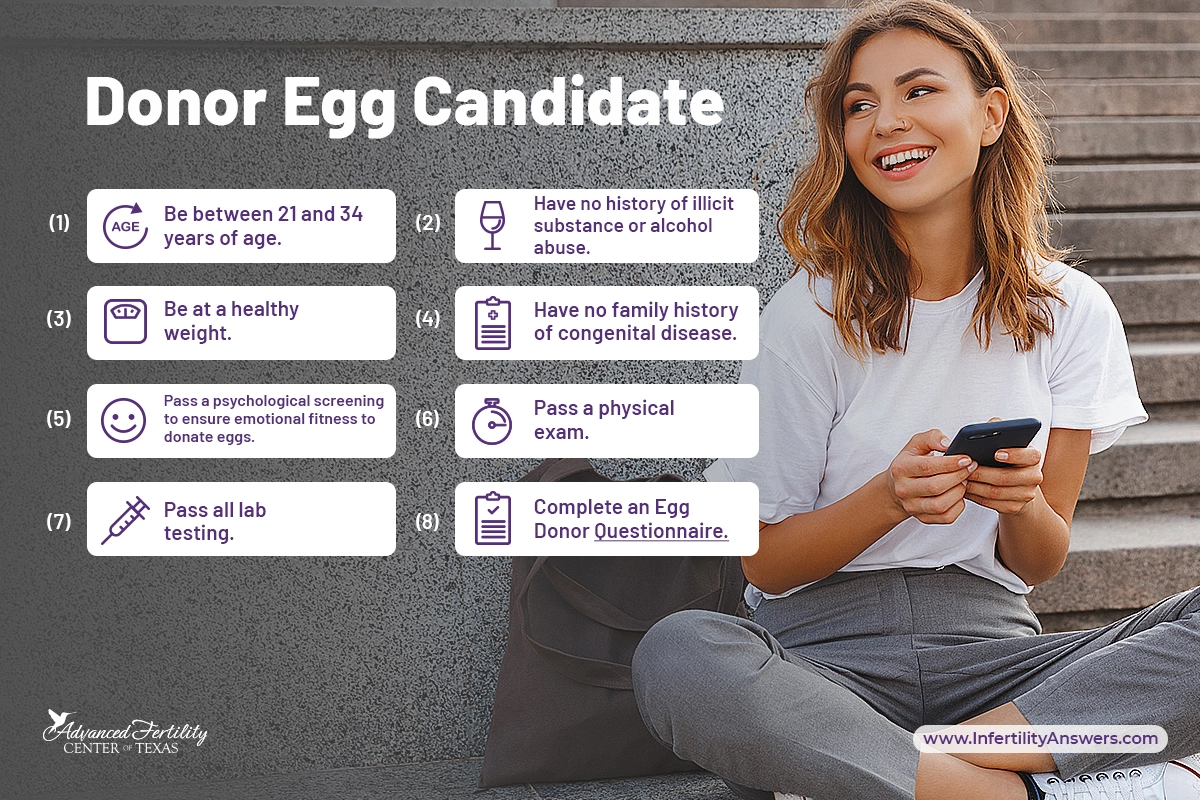What You Need to Know About Egg Donation
Advanced Fertility Center of Texas:
Meta: At The Advanced Fertility Center of Texas, we work with both egg donors and recipients. Learn what to expect on both sides of the process, so you can decide whether egg donation is right for you.
Or
Meta: Whether you’re an egg donor or a recipient, learn what to expect on both sides of the process, so you can decide whether egg donation is right for you.
Egg Donor- IVF
Egg donation is a major decision for both egg donors and recipients. It is truly a fulfilling experience. Women who cannot get pregnant on their own sometimes rely on an egg donor to have a family they have always wanted.
Whether you’re an egg donor or a recipient, this article will help you understand the fundamentals of the egg donation process, dispel any confusions and help you decide if it is indeed the correct choice.
What Does It Mean To Become An Egg Donor?
To become an egg donor is to give the gift of a child to someone who is unable to have one on their own. Couples look to healthy egg donors for a chance to build a family when they cannot become pregnant with their own eggs.
Women who participate in egg donation make a serious commitment to helping these couples by offering their own eggs to be harvested. However, several misconceptions exist regarding the process.
Many assume egg donation is an easy way to make a substantial amount of money while helping others. However, egg donation is a very personal decision that should not be taken lightly.
While egg donors are almost always compensated generously financially, egg donation is not simple or quick. It takes several months and can be physically and mentally taxing. However, those who go through with egg donation are providing an unequaled service to a couple. So, if you are considering egg donation, arm yourself with the knowledge of the process so you know what to expect.
Who Is a Good Candidate to Donate Eggs?
All potential donors must undergo a rigorous screening process to qualify for egg donation, based on a set of strict criteria. Donors must:
1. Be between 21 and 34 years of age.
2. Have no history of illicit substance or alcohol abuse.
3. Be at a healthy weight.
4. Have no family history of congenital disease.
5. Pass a psychological screening to ensure emotional fitness to donate eggs.
6. Pass a physical exam.
7. Pass all lab testing.
8. Complete our Egg Donor Questionnaire.

Donor Egg Candidate
- Be between 21 and 34 years of age.
2. Have no history of illicit substance or alcohol abuse.
3. Be at a healthy weight.
4. Have no family history of congenital disease.
5. Pass a psychological screening to ensure emotional fitness to donate eggs.
6. Pass a physical exam.
7. Pass all lab testing.
8. Complete our Egg Donor Questionnaire.
Other Requirements
In addition, it’s ideal for candidates to have at least ten follicles (eggs) at their baseline ultrasound to increase the odds of conception. Couples may also have additional specific requirements of their egg donor — for example, they may prefer a donor with a college degree or a donor of their own race or ethnicity.
Important Factors To Consider While Becoming An Egg Donor
In addition to improving your understanding of the egg donation process, taking the following measures will give you the peace of the mind that that you’ve made the right choice and that the process takes place with the minimum of fuss.
- Do Your Research
Whether you’ve been approached by a fertility clinic or you’re actively seeking an egg donation opportunity, thorough research is crucial to a successful and stress-free process. Start by observing the fertility clinic’s website. While not a promise, a clean, professionally done website is a promising start.
Focus your attention on the transparency of the information. Are they upfront about what to expect and the risks involved? Have they addressed the more difficult questions openly?
- Interview Potential Agencies (Or Clinics)
Don’t be shy to ask questions. Start by enquiring about the staff’s experience and training. A highly experienced staff should naturally put you at ease. A well-respected clinic will gladly share the credentials of their experts.
Secondly, ask for references. If the clinic hesitates to connect you with past donors they have worked with, then that’s a red flag. Most importantly, you should never let your desire to be accepted as a donor, cloud your judgment. Understand that if you’re healthy and fulfill basic donor requirements, it won’t be an issue finding a suitable agency or fertility clinic.
- Get Recommendations
While online research is a great first step, however, you should not rely solely on what you find on online forums or message boards. It’s best to check with your gynecologist, s/he will most likely be able to give you an unbiased opinion on the clinic in question. Secondly, crosscheck with your friends, family or anyone in your extended social circle who has donated previously.
What To Expect During An Egg Donation Cycle?
If you’re approved as an egg donor, the first thing that will happen is that you’ll receive doses of follicle-stimulating hormone (FSH) and human chorionic gonadotropin. These hormone injections will maximize the number of eggs available for retrieval and should be administered about 10-12 days before the harvesting procedure.
The harvesting procedure itself is rather short and should be completed in 20 to 30 minutes at the most, and is under anesthesia. A physician will insert an ultrasound probe with suction capabilities into the vagina to attain an egg from as many follicles as possible.
Fortunately, the procedure isn’t painful. That said, it’s normal to experience cramping and discomfort in the days after, Long-term effects are rare, but one in ten donors may experience ovarian hyper-stimulation syndrome afterward due to the hormones received before harvesting.
Expected Compensation
Because of the time and potential side effects of egg donation, donors are compensated generously — compensation is generally several thousand dollars for US-based donors, though the exact number varies depending on fertility center, region, and more. That said, egg donation is a serious commitment, and it shouldn’t be seen as a quick and easy way to make money; rather, donors should be primarily driven by their desire to help a couple start a family.
If you believe you’re a good fit for egg donation, contact the Advanced Fertility Center of Texas. We’ll be more than happy to discuss the procedure and answer any questions you may have.
After An Egg Donation Cycle
Most women can resume their normal activities within a day or two of the donation procedure. Your doctor will likely advise you to not have sexual intercourse for a few days after the donation cycle.
You should pay attention to how your body behaves in the first few days. Lookout for symptoms such as bloating and pelvic tenderness. They should disappear once you have your period. However get in touch with the doctor if they persist or you notice other symptoms such as:
- Vomiting or nausea
- Unusual weight gain
- Decreased urination
- Shortness of breath
- Pain or redness in the leg
Risk Factors Of Egg Donation
Modern medical protocols have made the egg donation process quite safe and the associated risk are similar to that of a woman who chooses to use her own eggs while going through an IVF cycle.
- Bleeding: The doctor will insert an ultrasound-guided needle into the donor’s ovaries to harvest eggs. This may lead to bleeding for some women. Other issues may include complications with the bowel, bladder, or nearby blood vessels, however, it is quite unlikely.
- Infection: Some women may experience infection after egg retrieval. However, it should not be of concern since it can be managed with antibiotics.
- OHSS (Ovarian Hyper-stimulation Syndrome): Your doctor may recommend taking ovulation promoting medication. In rare cases, it may cause OHSS; a condition where ovaries get filled up by fluid.
When Should You Consider Egg Donation to Get Pregnant?
Now that we have looked at things from the donor side, let’s explore how does the egg donor process work for the recipient?
Egg donation is not the first method people turn to when trying to get pregnant, but there are several reasons a woman might turn to egg donation:
- A serious hereditary disease that a woman does not want to pass to her child
- Cancer that has damaged or destroyed eggs reserves
- Failed IVF treatments have because of poor egg quality
- Older women (typically over the age of 43)
- Women with low ovarian reserves
The important thing to remember when choosing to get pregnant with an egg donor is that the child will not be biologically related to you. Egg donation can also be done using donor sperm in which case the child is not biologically related to either parent, but many women who choose egg donation still use their partner’s sperm.
Giving up being the genetic mother of your child is a personal decision. For some women, it is an easy choice because of their circumstances, but for others, it can be more challenging.
The fertility wellness experts at the Advanced Fertility Center of Texas will gladly help you assess the benefits and drawbacks of egg donation.
How Does the Egg Donor Process Work for the Recipient?
If you do choose to go the route of an egg donor, then you probably want to know how the process works from your perspective. Here are the steps you can expect:
- The couple examines the pool of egg donors currently available and picks a potential donor.
- The donor is contacted and if she is available and passes all tests, a match is made.
- After the donor has the eggs retrieved and embryos are frozen, we start preparing recipient for transfer. Before we freeze the embryos, intended parents can also opt to test the embryos genetically to rule out chromosomal abnormalities, like Down syndrome. This test also reveals the gender of the embryos. If we have both female and male embryos, intended parents have option to choose specific gender.
- Before transfer, the recipient will undergo a hysteroscopy to ensure that everything is healthy. She will also take an estrogen supplement and progesterone shots to prepare the endometrium for the embryo
- Two weeks after the transfer, the recipient takes a pregnancy test to see if the process worked. Hopefully, she will be pregnant.
This process is known as egg donor IVF (in vitro fertilization) when the partner’s sperm is used rather than a sperm donor. When a sperm donor is used along with an egg donor, it becomes embryo donor IVF.
The chances of a successful pregnancy with egg donor IVF are quite high, especially when compared to other options, for women aged 40 and above. Of course, there is no guarantee of success and anyone choosing artificial means of conception must keep that in mind.
Contact Us
If you have a question either about becoming an egg donor or about using an egg donor to become pregnant, the Advanced Fertility Center of Texas is here to help. You can schedule an appointment with us by calling 713.244.8735.
Contact Us With Your Egg Donation Questions
It doesn’t matter what’s preventing you from getting pregnant, we at the Advanced Fertility Center of Texas, intend to provide you with the knowledge to help you conceive successfully.
If you have questions about either about becoming an egg donor or about using an egg donor to become pregnant, we invite you to get in touch with the Advanced Fertility Center of Texas. Please call us at (713) 467-4488 and our team will gladly guide you through.


